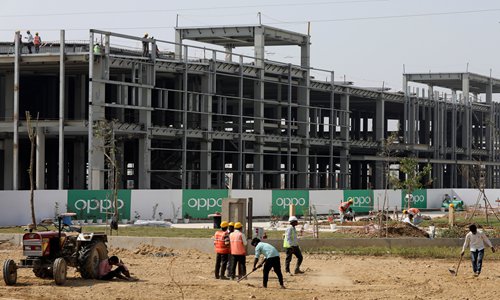The Indian government should protect the legitimate rights and interests of Chinese firms in India, Chinese analysts urged, as New Delhi launched investigations into multiple Chinese companies on tax and income issues. An India-based source familiar with the matter told the Global Times that the operations of Chinese firms remain normal at the moment, but relevant companies are looking to reassure their Indian employees as the investigation has caused some concerns.
The investigation has not been concluded yet, but some Chinese experts reiterated on Thursday that the business environment in India is harsh not only for Chinese firms but all foreign companies. They pointed out that “non-market factors” in India will have large and unpredictable effects on them and cause many problems, and many Western companies have already pulled out from the country for this reason. They urged Chinese firms to be cautious in investing and doing business in India, and strictly follow the local laws and leave no excuse for the authorities to take actions against them if those companies choose to stay there.
In a “major crackdown” on Chinese mobile companies, India’s Income Tax Department is conducting searches on leading Chinese mobile companies including Oppo, Xiaomi and OnePlus across the country, according to a report by Indian news agency the Asian News International (ANI) on Wednesday.
The CEOs of some fintech companies are included in the search and are currently being interrogated by income tax authorities, ANI reported, citing people familiar with the matter.
A day earlier, according to the Indian media outlet Economic Times, Indian anti-smuggling agency Directorate of Revenue Intelligence had searched the factories of Foxconn India’s unit, Bharat FIH, and Dixon Technologies in South India, government officials said. Bharat FIH and Dixon are contracted manufacturers for Xiaomi.
More than 20 premises in the National Capital Region, Mumbai, Rajkot and Karnataka linked to Oppo and Xiaomi were searched by the tax department, according to people aware of the matter. Searches were also conducted at the offices of OnePlus, the Chinese company that has merged into Oppo but operates as a separate brand.
Normal so far
In a statement sent to the Global Times on Thursday, a Xiaomi spokesperson said: “As a responsible company, we give paramount importance to ensuring that we are compliant with all Indian laws. As an invested partner in India, we are fully cooperating with authorities to ensure they have all the required information.”
OnePlus told the Global Times on Thursday that its India unit has no comment at the moment.
The Global Times also reached out to Oppo seeking a statement, but has not received a response.
Earlier this year, OnePlus announced the merger with Oppo to offer better products to its customers, but it still operates as a separate brand.
Along with Chinese vendors, their contract manufacturers were also subject to searches.
Foxconn told the Global Times on Thursday that it is looking into the matter.
Wednesday’s searches also covered the offices of some of the Chinese distribution partners of Oppo, per the Economic Times report, and one of the partners was recently penalized.
Indian officials have pushed Oppo and Vivo to stop operating through their Chinese partners for distribution in the Indian market and leverage local partners instead, the Economic Times reported in October.
Unlike Xiaomi’s sales strategy, which is focused on online channels, Oppo and Vivo are highly reliant on offline sales via distributor networks.
An industry figure close to the matter told the Global Times on Thursday that “the search’s scope is quite large with strengthened measures this time, and some bank accounts seem to have been frozen. The situation has affected employees’ emotions but the reported vendors’ operations are still normal.”
A second source, based in India, close to the matter told the Global Times on Thursday that “Chinese companies are actively cooperating with India’s investigation, and there has not yet been a conclusion. But that does not rule out the possibility that India is purposely targeting certain vendors, and as I have learnt, Oppo stands the highest chance this time.”
Harsh business environment
“India’s tax laws are very complicated, and in recent years, many Indian companies and some joint venture enterprises have also been investigated over tax issues,” said Qian Feng, director of the research department at the National Strategy Institute at Tsinghua University.
Although the latest investigation seems likely to have been mainly driven by economic reasons, the possibility of a political impact still exists, because there are extreme anti-China forces in the government, and they will look at matters related to Chinese firms in India with a discriminatory attitude, Qian said.
Lin Minwang, a professor at the Institute of International Studies at Fudan University, told the Global Times that “the investigation is not a surprise at all, because the Indian authorities, especially those in some local governments, don’t care about how Chinese firms feel because they are pushing for ‘decoupling with China’ and they see Chinese firms as perfect targets, and they don’t care how Chinese investors will look at the business environment in the country.”
According to the latest report by industry research agency Counterpoint, Xiaomi led the Indian market in the third quarter with a 22 percent market share driven by the Redmi 9 series and Redmi Note 10 series. Samsung captured the second spot with a 19 percent share. Oppo took fifth spot with a 10 percent share.
During the quarter, OnePlus also registered its highest ever shipments in India. The brand captured the second spot in the premium segment.
Many foreign companies, including those from the US like Wal-Mart, have also experienced a situation similar to what Chinese companies are experiencing at the moment, and have pulled out from the country, while the US has also complained about the business environment and investment climate in the past.
Lin said making problems for foreign companies and fining them under the pretext of law is an “Indian tradition” that Lin called “Shut the door and kill the pigs.”
Chinese experts urged the Indian government to protect the legitimate rights and interests of the Chinese firms and provide a rule-based business environment.
The Indian authorities’ behavior of using legal pretexts sounds reasonable but their intention is clear, so Chinese firms in India need to seriously regulate their operations and management, Lin noted.
Qian said the best way for Chinese firms is to be careful and serious when handling matters related to tax and leave no opportunity for Indian authorities to investigate or sanction them.
Construction workers labor at the OPPO factory that is under construction in Greater Noida, India, on October 22, 2018. Photo: VCG




